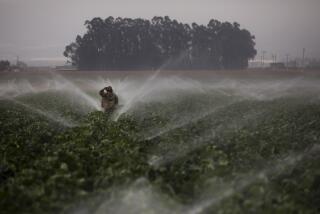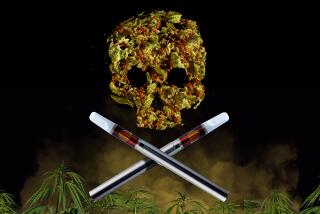Worker testifies in pesticide case
- Share via
A worker from Honduras testified in a Los Angeles courtroom Tuesday that he and his wife tried for a decade to have children but failed to conceive after he went to work on a banana plantation where the pesticide DBCP was used.
“As a man I’m worthless,” Benancio Lizandro Espinoza said with the aid of a translator when asked how he felt when he found out he was sterile.
Espinoza is one of a dozen banana farm workers who are suing Dole Fresh Fruit Co. and Standard Fruit Co., now part of Dole, charging that exposure to DBCP -- the abbreviation for dibromochloropropane -- in the 1970s made them sterile. The lawsuit also said that Dow Chemical Co. “actively suppressed information about DBCP’s reproductive toxicity.”
Duane Miller, the attorney representing the former workers, has said the company improperly applied the pesticide and used it in amounts exceeding guidelines. Even after it was revealed that Dole workers in Costa Rica had infertility problems caused by DBCP, Dole never had a program to test its employees in Nicaragua, he said.
Eleven of the 12 plaintiffs have no sperm in their bodies as a result of exposure to DBCP, he said.
Attorneys for Dole, the world’s largest producer of fresh fruits and vegetables, argue that the workers’ exposure wasn’t severe enough to cause sterilization and that there is always a certain percentage of a population that is sterile. Attorney Rick McKnight said the pesticide was diluted with water before being sprayed at night for 15 minutes and that the plants were then washed with 56,000 gallons of water for more than an hour afterward.
DBCP was used to kill microscopic worms on the roots of banana plants and was approved for use in the United States by the Environmental Protection Agency until 1979. In Nicaragua, it was legal from 1973 to 1993.
Before he went to work at the plantation, Espinoza said, he and his wife had three children but were unable to conceive after he got a job at the banana farm in 1969.
Attorneys for Dole and Dow seized on discrepancies between Espinoza’s court testimony and his 2005 video deposition, which they said showed Espinoza and his wife tried to conceive for a decade before he was exposed to DBCP.
Another plaintiff, who also testified Tuesday, said he was never able to conceive with his longtime girlfriend even though she had children from a previous relationship.
Joe Uriel Gutierrez said he lived on the plantation and could often smell the remnants of DBCP, adding that the scent sometimes gave him headaches.
Gutierrez, who has lived alone since his girlfriend died two years ago, said his sterility made him “very sad because of not having a child.”
The case is one of five filed in Los Angeles County by at least 5,000 agricultural workers from Nicaragua, Costa Rica, Guatemala, Honduras and Panama.
More to Read
Sign up for Essential California
The most important California stories and recommendations in your inbox every morning.
You may occasionally receive promotional content from the Los Angeles Times.










